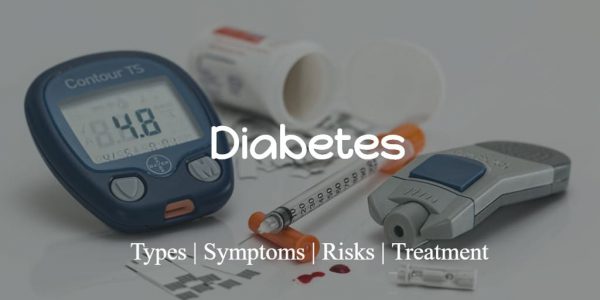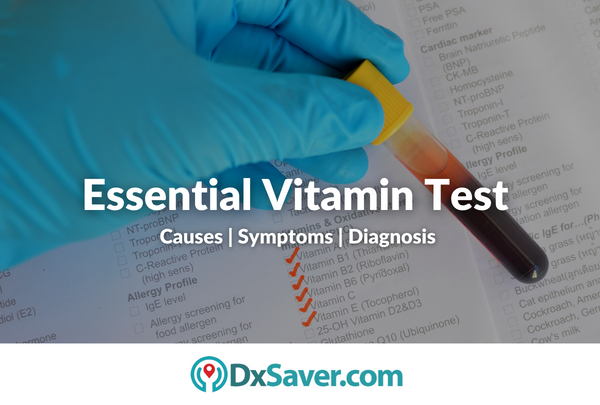
For your body’s ability to function and maintain health, vitamins are necessary nutrients. An individual needs a different quantity of each vitamin to keep healthy since each vitamin has a different function in the body. Since the body is unable to synthesize vitamins and produces very few of them, the majority of our vitamin needs must be met by diet. When there is insufficient consumption of vitamin-rich foods, the body develops vitamin deficiencies.
This blog will describe what vitamins are, what they do, their deficiencies and symptoms, and which foods are good sources.
- What are vitamins
- What are vitamin deficiencies?
- What are the causes of vitamin deficiencies?
- What are the symptoms of vitamin deficiencies?
- Diagnosis: What is an essential vitamin test?
- Why take an essential vitamin test?
- When to take an essential vitamin test?
- Are there any procedures before taking the vitamin test?
- Providers location
For our readers, who are more interested in knowing the Essential Vitamin testing cost beforehand, we begin with that section.
How much does the essential vitamin test cost?
An Essential Vitamin test costs $109 in the U.S. The cost of an Essential Vitamin test also depends on your choice of visiting the nearest lab or getting tested at home using the Essential Vitamin home test kit. Complete the procedure and get the results in your email in 2 to 5 business days. Doctor consultation is also available for further treatment or any kind of medical advice.
The following table shows the Essential Vitamin home test kit cost by one of our partners located in the U.S.
Name of our Partner Labs | Book Online |
LetsGetChecked(Home Test Kit)
| Offer Price$109 |
What are vitamins?
Vitamins are organic substances that the body mandatorily requires for the purpose of healthy cellular metabolism and functioning. They are essential for the production of energy, blood coagulation, and enhancing our resistance to a bacterial and viral illnesses. These substances can be classified as fat-soluble and water-soluble vitamins.
Fat-soluble vitamins are taken up by fat globules that move through the small intestines and are then circulated throughout the body through blood vessels. Surplus fat-soluble vitamins are stored as a reserve in the liver and fatty (adipose) tissues. Fat-soluble vitamins comprise the following:
- Vitamin A
- Vitamin D
- Vitamin B12
- Vitamin E
- Vitamin K
Vitamins such as vitamin B12 and vitamin c are water-soluble. Water-soluble vitamins are the ones that are easily dissolved in water and are quickly absorbed into tissues for usage. Water-soluble vitamins must be renewed frequently through your diet since the body cannot store them.
The following are the essential vitamins that are required for the regular functioning of the body:
Vitamin A
Vitamin A, also known as retinol or retinoic acid, is an essential component for immunity, cell division, development, and eyesight. Additionally, vitamin A has antioxidant qualities that prevent your body from getting affected by cancer and heart diseases, which are caused by free radicals.
Vitamin A foods are:
- Carrots
- Sweet potatoes
- Tomatoes
- Milk
- Eggs
Vitamin B12
Vitamin B12 is considered to be an important nutrient among the eight B vitamins. This vitamin is crucial for maintaining metabolism. A healthy pregnancy depends on having sufficient vitamin B12 levels in the blood. In addition to manufacturing genetic material and red blood cells that transport oxygen throughout the body, vitamin B12 is a water-soluble vitamin that is essential for maintaining a healthy neurological system.
Sources for Vitamin B12:
Animal products are naturally classified as vitamin B12 foods. Other sources include:
- Lamb
- Beef
- Tuna
- Clams
- Sardines
- Chicken breast
- Eggs
- Low-fat milk
- Yogurt
- Cheese
Vitamin C
Vitamin C is also known as ascorbic acid. It helps in the prevention of infections and the recovery of wounds. Vitamin C is supportive of the production of various hormones and chemical messengers that are utilized in the brain and nerves.
Vitamin C foods are:
- Brussel sprouts
- Tomatoes
- Strawberries
- Citrus fruits include lemons, oranges, and kiwis.
Vitamin D
The immune system, bones, and teeth all benefit from vitamin D, a fat-soluble vitamin. Vitamin D reportedly reduces the risk of both diabetes and cancer. Up to 90% of this vitamin is created by sunshine exposure on the skin, with the remaining 10% coming from food.
Foods high in vitamin D:
- Kale
- Mushrooms
- Oranges
- Fatty fish such as salmon and swordfish
- Cod liver oil
- Egg yolk
- Fortified milk, spreads, and breakfast cereals.
Vitamin E
A fat-soluble vitamin called vitamin E functions as an antioxidant to aid in shielding cells from injury. It aids in maintaining your eyesight and improves your immune system. Vitamin E has an impact on skin health by functioning as a free-radical scavenger, it shields the skin against a variety of damaging effects caused by sun radiation.
Foods high in vitamin E:
Vitamin E foods are naturally present in nuts, seeds, fruits, vegetables, and plant-based oils. These natural sources can consist of the following:
- Almonds
- Peanuts
- Hazelnuts
- Spinach
- Broccoli
- Avocado
- Cereals
- Wheat germ oil
- Sunflower oil
Vitamin K
Vitamin K is a fat-soluble vitamin and is essential for making blood clot and reducing heavy bleeding. It helps in stopping osteoporosis and promotes healthy bones.
Vitamin K-rich foods are:
- Spinach
- Lettuce
- Soybeans
- Canola oil
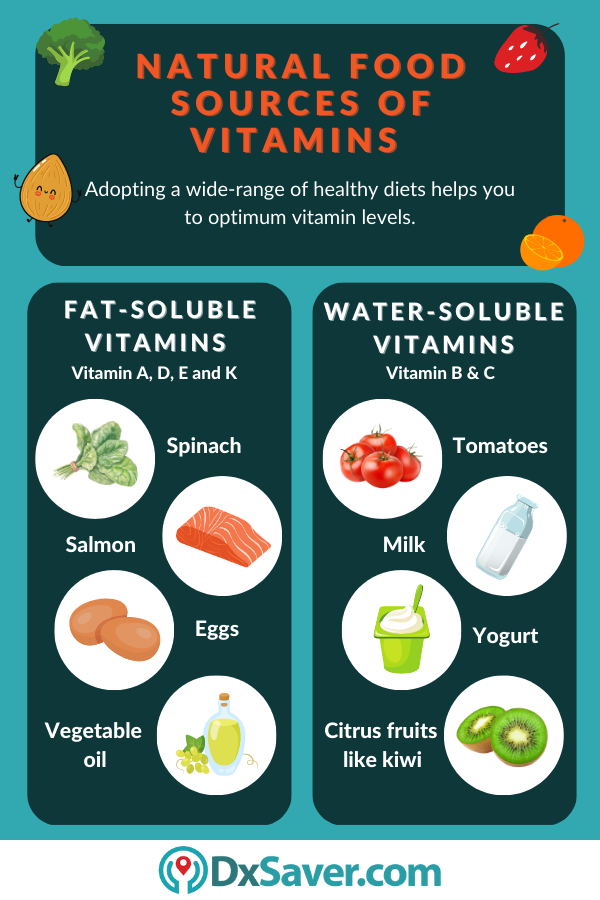
What are vitamin deficiencies?
Vitamin deficiencies are conditions that arise due to a lack of one or more essential minerals. All ages are susceptible to vitamin deficiencies, which often coexist with mineral deficiencies. A variety of biochemical activities such as health deterioration are connected to vitamin deficiencies.
Vitamin A and B vitamins such as vitamin B12, folate, and vitamin D deficiency are among the most prevalent. Examples of conditions that are caused due to vitamin deficiencies are Vitamin B12 deficiency anemia, scurvy, and more. While anemia occurs when the body does not produce sufficient healthy red blood cells, scurvy refers to vitamin c deficiency that causes fatigue, profuse bleeding, limb discomfort, and occasionally gum ulcers and tooth loss.
What are the causes of vitamin deficiencies?
Each vitamin has different causes for deficiency in vitamins as they are unique to each other. The causes for the most prevalent vitamin deficiencies are listed as follows.
Vitamin A deficiency causes:
Your liver stores the majority of vitamin A in your body. Therefore, illnesses and disorders that make it difficult for your intestine to absorb fat can result in a vitamin A deficiency. These disorders include:
- Celiac disease
- Chronic diarrhea
- Excessive alcohol consumption
Vitamin B12 deficiency causes:
Lack of vitamin B12 in your diet or inadequate vitamin B12 absorption in your body might result in vitamin B12 deficiency. The following conditions are the other factors that can lead to a deficiency of vitamin B12:
- Gastritis: Gastritis is a common cause of vitamin B12 deficiency and is an inflammation of the stomach lining. Due to a lack of hydrochloric acid in your stomach, which is necessary for vitamin B12 absorption, it may result in a vitamin B12 deficiency.
- Diseases of the digestive system: Conditions like Crohn’s disease and celiac disease might hinder your body from absorbing vitamin B12 completely.
- Surgery: Individuals who have gastrointestinal surgery, including a gastric bypass (weight-loss surgery), may experience issues with vitamin B12 absorption.
- Alcohol use disorder: Excessive alcohol drinking can harm your digestive tract and result in vitamin B12 deficiency.
- Transcobalamin II: A uncommon hereditary condition known as transcobalamin II deficiency affects the body’s ability to transfer vitamin B12, commonly known as cobalamin.
Causes for vitamin C deficiency:
Vitamin C is not produced by humans. External food sources are required for it. As a result, a deficiency arises from:
- Consuming a diet deficient in fresh fruits and vegetables
- Ailments like anorexia and ulcerative colitis
- Smoking
- Increased alcohol consumption
Vitamin D deficiency causes:
Vitamin D insufficiency generally has two major causes: (1) Not obtaining adequate vitamin D levels from food or from sunshine or (2) Vitamin D is not being used or absorbed by your body effectively. Lack of vitamin D can result from a variety of specific factors, such as:
- Cystic fibrosis, Crohn’s disease, and celiac disease: If left untreated, these illnesses might stop your intestines from properly receiving sufficient vitamin D from supplements.
- Obesity: Lower vitamin D levels are linked to a body mass index above 30. Vitamin D is kept contained in fat cells so that it cannot be released.
- Liver and kidney disorders: These diseases can lower the levels of the required enzymes that your body needs to convert vitamin D into a form it can utilize. The absence of these specific enzymes (hepatic enzyme 25–hydroxylase from your liver and 1-alpha-hydroxylase from your kidneys) can lead to vitamin D deficiency.
- Gastric bypass surgery: This is a surgery that is done to lose weight which involves bypassing a portion of your small intestine or shrinking the size of your stomach. Such surgery can make it challenging for your body to consume enough of several vitamins, minerals, and nutrients.
- Consumption of certain medications: Medications such as laxatives or steroids like prednisone can reduce the vitamin D levels in your body
Vitamin E deficiency causes:
Deficiencies in vitamin E frequently result from an underlying disorder. If you observe symptoms of vitamin E deficiency, you should talk to a doctor if you don’t already have a diagnosis.
You should watch out for this deficiency if you have one of the following disorders.
- Cholestasis
- Chronic pancreatitis
- Cayman fibrosis
- Primary cirrhosis of the liver
- The short bowel syndrome in Crohn’s disease
Vitamin K deficiency causes:
In healthy people, vitamin K deficiency is uncommon. If you are affected by vitamin K deficiency, then you will have significant health issues like:
- Using anticoagulants like warfarin
- Having cystic fibrosis
- Digestive issues that result in fat malabsorption or a clogged bile duct
- A vitamin K shortage is also more likely to occur in those who use antibiotics often.
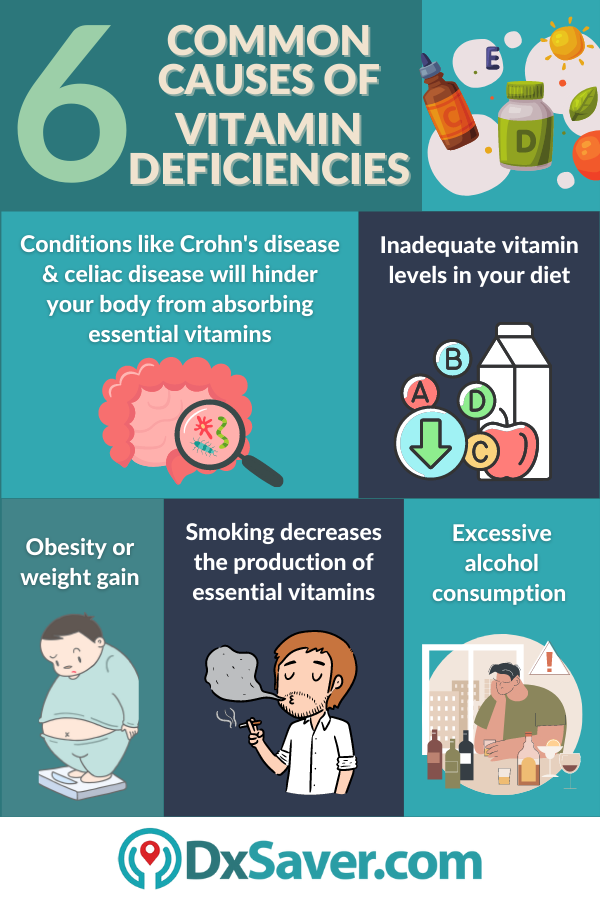
What are the symptoms of vitamin deficiencies?
Most individuals with moderate vitamin deficiency may or may not exhibit any of its symptoms. However, you will start experiencing symptoms when the body’s levels of essential vitamins start reducing drastically.
Common Symptoms of a vitamin deficiency include the following:
- Weakness, exhaustion, or a loss of energy
- Aches and pains in muscles
- Difficulty in breathing
- Decreased immunity and increased disease vulnerability
- Difficulties with your vision
- Bone health issues
- Ulcers in the mouth
While the most commonly occurring symptoms have been listed above, it is necessary to note that symptoms might vary greatly depending on the kind of vitamin deficiency. They are listed as follows:
Vitamin A deficiency symptoms:
- Recurrent infections
- Dry skin
- Difficulty seeing in low light
- Dry eyes
- Trouble in conceiving
Vitamin B12 deficiency symptoms:
Following are examples of general physical vitamin B12 deficiency symptoms:
- Feeling exhausted
- Experiencing vomiting
- Diarrhea
- Having sore tongue
- Loss of appetite
- Having skin that is yellow.
- Loss of weight.
Vitamin B12 deficiency can cause the following psychological symptoms:
- Getting upset regularly
- Getting irritated
- Experiencing a shift in your emotions and behavior.
Vitamin B12 deficiency can cause the following neurological symptoms:
- Your hands and feet will feel numb or tingly.
- Difficulties with vision.
- Quickly getting confused or having memory loss
- Being unable to move or talk as normally as before.
Vitamin C deficiency symptoms:
- Tangled hairs
- Gum disease and tooth loss
- Delayed wound healing
- Difficulty in breathing
- Variations in mood and depression
Symptoms for Vitamin D deficiency :
- Loss of hair
- Alterations in joints
- Erratic sleeping patterns
- Tiredness.
- Bone stiffness.
Symptoms for Vitamin E deficiency:
Having a vitamin E deficiency is not common. But the following indicators may indicate that you are experiencing it:
- Feeling of weakness
- Headache
- Numbness and tingling sensation in your muscles
- Difficulties in coordination and walking
- Weak immune system
- Difficulty with the vision
Vitamin K deficiency symptoms:
- Susceptible to injuries
- Experience excess bleeding after getting an injury
- Your menstrual period may get heavier
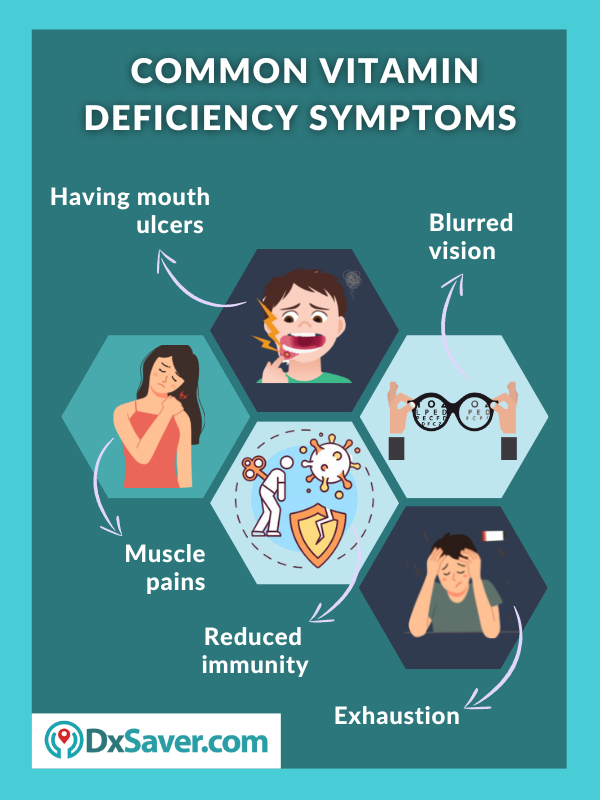
Diagnosis: What is an essential vitamin test?
An essential vitamin test determines and monitors the vitamin or mineral levels present in the blood. You can identify significant abnormalities with the help of this test and by analyzing the results you can take steps to improve your overall health and immune system. Those under the age of 22 are not to take the vitamin B12 test. You will not get a result from a vitamin B12 test if you’re younger than 22.
You can conduct a finger-prick test on your own using an at-home vitamin test kit to collect blood. On the other hand, a nurse can also draw blood from a vein for a venous blood test as an alternative. Within 2 to 5 days after your sample is received at the lab, you will see the confidential reports from your encrypted online account.
LetsgetChecked home kits are known to be the best home kits for vitamin testing. LetsGetChecked home kits primarily check for vitamin B12, vitamin D, and vitamin E. They also have a team of trained healthcare professionals who will call you to discuss your results and are accessible around the clock.
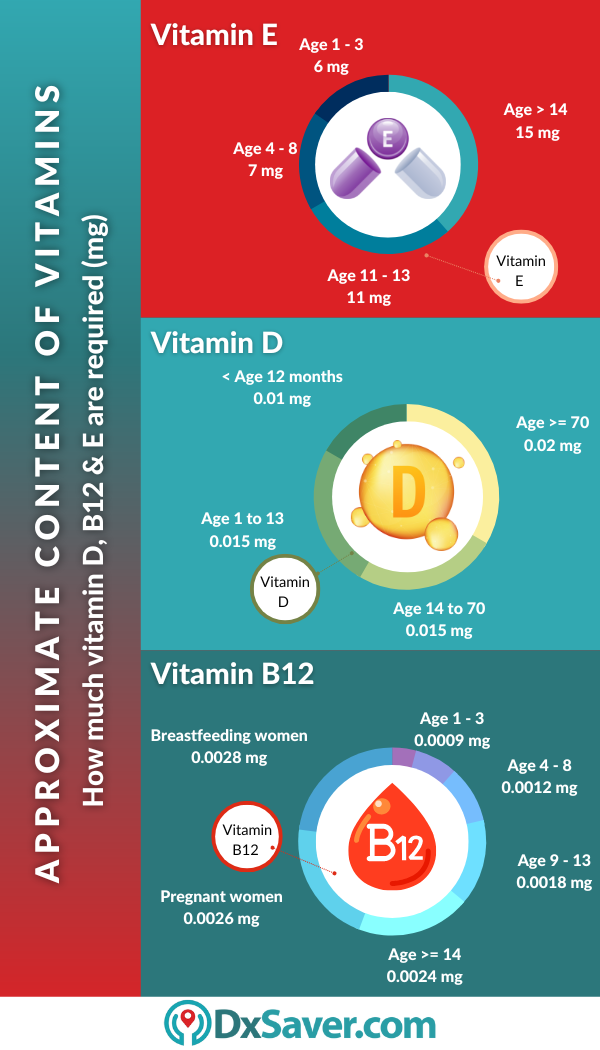
Why take an essential vitamin test?
The Essential Vitamin Test will provide you with comprehensive information about your diet, allowing you to readily identify and correct any deficiencies. It will be challenging to determine if you are vitamin deficient without a test. Testing can help you maintain an ideal body by ensuring that you are getting enough nutrients when paired with a varied and balanced diet. At-home vitamin deficiency test kits can help you identify which nutrient you’re deficient in.
Anyone can become vitamin deficient. However, some people could be more at risk due to diseases like Crohn’s disease that affect food absorption or people consuming a vegetarian diet. As you become older or as a result of taking certain medications, your dietary requirements could vary. Following the phrase, “prevention is better than cure,” essential vitamin tests are mandatory to keep a check on your body’s health and to maintain adequate vitamin levels in your body.
When to take an essential vitamin test?
- You wish to pinpoint areas where your general health should be improved.
- You mainly consume vegetarian or vegan food.
- You grow older than 50 years.
- You suffer from an illness like Celiac disease or Crohn’s disease that may affect how well nutrients are absorbed.
- You experience issues with nutrition absorption from your food.
- You are displaying symptoms of vitamin deficiencies
- You are consuming some medications, such as proton pump inhibitors, that reduce nutritional consumption
- You are pregnant and are vulnerable to diseases
You are suggested to talk to your healthcare provider about the symptoms that you are experiencing and schedule your test accordingly.
Are there any procedures before taking the vitamin test?
The basic procedure that you must follow before taking the test is to fast and drink plenty of water. Drinking water is beneficial because it assists in maintaining more fluid in your veins, which facilitates easier blood sampling.
In the case of fasting, beverages such as coffee, juices, or soda should be avoided because they can interfere with the accuracy of results. When humans eat and drink, it is digested and absorbed into circulation. Blood levels of certain chemicals, like cholesterol or blood glucose, may be impacted by this. So, it is recommended that you take the sample in the morning, before breakfast. Always heed your doctor’s recommendations when it comes to fasting, especially if you have any health issues.
You should also refrain from the following activities since it affects your results:
- Chewing gum
- Smoking
- Alcohol consumption
- Exercise
If you are someone taking any prescribed medications for the purpose of any treatment, then you can continue taking them. However, you have to avoid taking any nutritional, dietary, or vitamin supplements at least 48 hours prior to your sample collection. If you are taking supplements for biotin or taking calcium supplements such as L-tryptophan and vitamin C then you should stop taking them one week prior to the test.
The test needs to be completed before 10 a.m. on a Monday, Tuesday, Wednesday, or Thursday while fasting, and it needs to be returned that same day.
Providers location
An essential vitamin test can be done at any of your nearby labs or with our partner who sends the at-home test kit to your doorstep. To know the cost of an essential vitamin at-home test kit, refer to the first section of the article.
Frequently asked questions (FAQs)
1. What should you do if tests reveal a vitamin deficiency?
You might discuss vitamin supplementation with your doctor if the results of your vitamin deficiency test indicate that your blood levels of certain nutrients are too low. You could also think about changing your diet to include more foods high in those vitamins.
2. How frequently should vitamin levels in the blood be assessed?
There is no timeline to check your vitamin levels. If you already have a deficiency that has been identified, ask your doctor if a routine vitamin blood level test is required.
3. Which vitamin deficiency causes numb hands and feet?
Vitamin B12 causes a tingling feeling and numbness in your hands and feet.
4. Which vitamin deficiency causes hair loss?
A deficiency of vitamin D is the vitamin deficiency that causes hair loss. Your hair follicles may not be able to produce new hair as effectively when your vitamin B12 levels are insufficient, which can cause hair loss.
5. What are the signs of vitamin deficiency in nails?
A vitamin mineral deficiency can develop nails that are brittle, dry, cracked, and unevenly shaped.
Other topics you may be interested in:
- APOE gene test: Importance on brain health, symptoms, and test cost
- PCOS Testing: Symptoms, Causes, and Testing Cost
- Treatment of tapeworm infection
- Test cost for Magnesium Blood Test in the U.S.
- How to order an at-home Gonorrhea test kit?
- The purpose of an IgE Allergy test
- Causes for Stinging Insect Allergy
- How to order an at-home Herpes test kit?
- What is the purpose of a wellness checkup?






